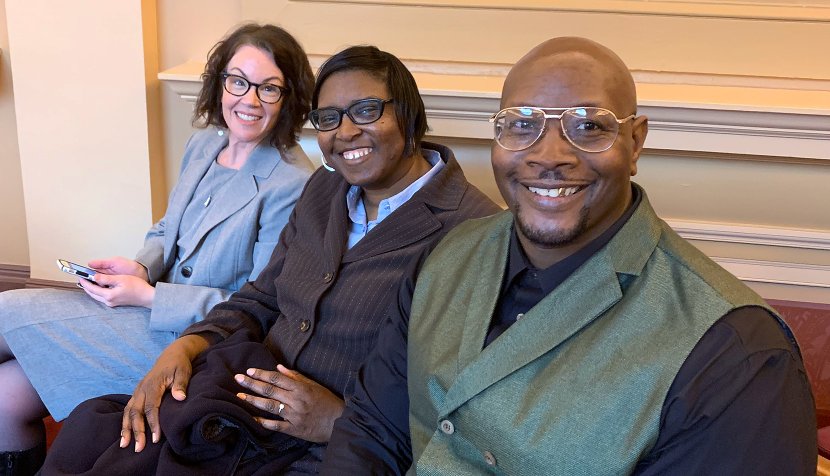Professor Jennifer Givens, left, one of the directors of the Innocence Project at UVA Law, gave testimony at the Virginia General Assembly in 2020 along with client Darnell Phillips, seated with his fiancée, Nichelle Ruffin. Photo by Juliet Hatchett
By ALAN CLANCY
(CNS) – A bill proposed by Sen. Louise Lucas, D-Portsmouth, that has passed the General Assembly would change the level of compensation provided to wrongfully incarcerated persons upon their release from prison in Virginia.
Under current law, a person receives 90% of per capita income for each year they were incarcerated. Lucas’s bill, SB 755, which passed the House Tuesday with block vote approval, will make compensation $55,000 per year of incarceration, adjusted annually for inflation.
Ninety percent of per capita income in Virginia was $55,762 in 2020, according to the St. Louis Federal Reserve. This means that, although the bill was proposed as a way to increase compensation for the wrongfully incarcerated, payment is higher under current law than under SB 755.
This was not the case with the original version of the bill. That version, which passed the Senate with minor adjustments on Feb. 4, would have linked compensation to median household income. In Virginia, this figure is often significantly higher than $55,000. It was $79,154 in 2020, according to the St. Louis Federal Reserve.
“The reason for the change that is needed is because wrongfully convicted individuals lose the opportunity to get their education, to build a career and learn technological skills,” Lucas said while describing the original version of the bill during the Senate vote on Feb. 4. “Restraints on individuals’ personal liberties don’t always end when the wrongfully convicted walk out of the prison.”
Sen. Jennifer McClellan, D-Richmond, who is a co-patron of SB 755, wrote in an email that she was pleased to join Lucas in advancing the legislation.
“The Commonwealth can never return the time unjustly taken from wrongfully convicted Virginians,” McClellan wrote, “but this bill will take major steps to enable them to transition back and receive the compensation they are due.”
Bills often change as they move through the legislative process, according to the U.S. House of Representatives website. Legislators debate and amend portions of the bill with which they disagree until the bill is killed or a final version is agreed upon. As a result, the version of SB 755 that received final passage in the House differs greatly from the version that Lucas and McClellan’s comments refer to.
In addition to increasing the amount of compensation, the original bill provided $25,000 per year for time spent as a registered sex offender or on death row, parole or probation. This portion was removed from the final version.
The original also amended current legislation to award the full compensation amount as a lump sum. The final version awards 25% as a lump sum, with the remaining 75% being used to purchase an annuity. This is a minor change from current law, under which 20% is awarded as a lump sum and 80% is used to purchase an annuity.
Additionally, the original bill removed provisions of current law that require wrongfully incarcerated persons to forfeit their unpaid compensation if they are convicted of another felony after their release. In this case, the final version remained consistent with the original and also removed this provision.
Julia Hatchett, associate director of the Innocence Project at UVA School of Law, wrote in an email that she and her organization supported SB 755 and were grateful for Lucas’s efforts but were disheartened to see so many changes in the final version.
Republicans hold a majority in the House, while Democrats have a majority in the Senate. The Senate vote was largely split across party lines, with only one Republican voting yes.
Sen. Frank Ruff, R-Clarksville, who voted no in the Senate vote, explained in an email his rationale for doing so.
“I believe that a better way to deal with the issue is an evaluation of each case individually,” Ruff wrote. “There are mitigating factors that should be considered on a case by case basis.”
The bill awaits Gov. Glenn Youngkin’s signature before it can become law.



